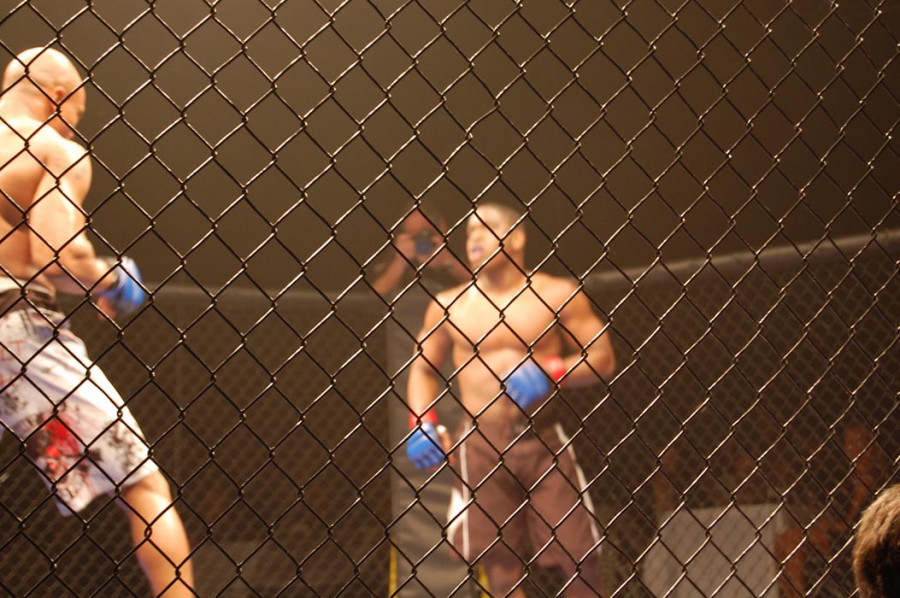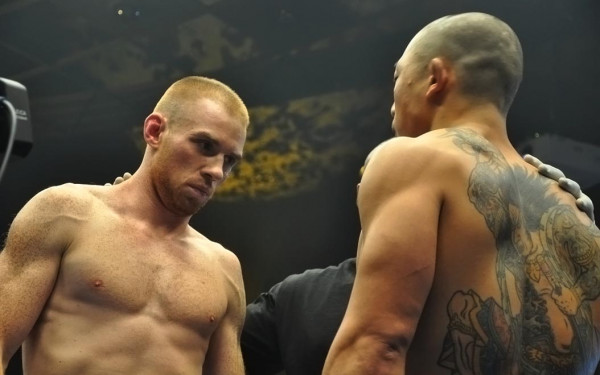Chud Fights in the Coliseum
A Night of Profanity, Screaming and Language Politics
At some point in my adult life, it will no longer be appropriate to conceal a bottle of gin between my pants and pelvis in order to get drunk at a prizefight. That thought, or some variation of it, crossed my mind as I awkwardly waddled past the usher at Montreal’s Bell Centre.
Like so many other fight fans, I’ve been suckered into watching backwoods Mixed Martial Arts with the promise of adrenaline charged thrills and momentary fits of insanity. But even a sucker knows to bring provisions. The gin was a failsafe, an insurance policy in the event that every fight was pure garbage. It was a way of drowning the potentially terrible card into a night of screaming and profanity.
Before walking to my seat, my friend pointed towards a mullet wearing man and yelled “Holy shit. You’re Miguel Torres.” Torres looks like a mulleted version of former child star Ralph Macchio. His limbs are comically skinny, he can’t quite grow facial hair and he has the skin of an eight-year-old boy.
To the everyman, he kind of just looks like the guy from My Cousin Vinnie. But among MMA fans, Torres has a cult-like following. He turned pro as a teenager and knocked his first opponent out in less than 10 seconds. For the bulk of his 20’s, he tore people apart fighting on regional shows for no money. Now he splits his time between his native East Chicago and Montreal where he’s training to make a run at the Ultimate Fighting Championship’s bantam-weight title.
Torres raised a plastic cup of whiskey and smiled at us. “Sweet Jesus,” I thought. “If Torres is shooting straight whiskey, we don’t stand a chance. The circus is in town, no fights tonight boys. Only staggering drunks, wildly swinging punches at each other’s faces.”
“What’s up? These guys are trying to get me drunk,” said Torres. “You fighting for the title soon?” I asked. “One more win and I get a title shot.” We shook his hand, basked in his mullet glory and walked to our seats.
The arena was almost empty. There were maybe 1,200 fans scattered across the lower bowl. The smell of thick, sweaty marijuana smoke filled our section of the Bell Centre. Cuing into the invitation to break rules, I poured myself some gin and watched the fight.
A pink-haired lightweight from Victoriaville had taken his opponent down and was throwing sporadic hammer fists. “Ground and pound!” a man behind me yelled. “Ground and pound!”
The man went off about why Quebecers are innately tough and built for hand-to-hand combat. I turned around to catch a peek at him. He was wearing a Harley Davidson t-shirt that said Ground and Pound in bold type.
By the time the next bout came around I recognized one of the fighters, Mike Ricci. About a year ago Ricci was invited to a 16-man lightweight tournament run by Bellator, one of the world’s largest promotions.
In the tournament’s opening bracket, he was knocked unconscious with a thundering left hook to the jaw.
The knockout sidelined him for months with a brain injury. After a year of recovery, Ricci finally came back to the regional show.
Ricci set the tone early, landing a few leg kicks and jabs. He then took his opponent down and began to work an arm lock, cunningly using the submission attempt to pass his opponent’s guard and advance to the mount position. From there, Ricci cut the man’s forehead open with a barrage of elbows, stopping the fight less than three minutes in.
Just as the bout ended, a few drunks go into it across from our section. Security jumped in and dragged the men away from each other. “Dirty animals,” someone yelled.
The night began taking an almost barbaric tone. Spirited cheers devolved into fits of screaming and heckling. Another scrum broke out in the section above us, sending a can of Coors Light rolling down the steps.
At some point in the evening, I made the unforgivable mistake of cheering against a Quebec-born fighter loudly, in English. This, I would soon find out, did not play well with some of my fellow audience members.
“Shut the fuck up,” yelled a Mohawk-sporting teenager. “We’re in Quebec, speak French.”
I couldn’t hear the kid very well, but he and my girlfriend began to argue for a few minutes. Eventually, his friends got involved and started grunting at us, challenging us to a fight.
“I’ll fucking kill you,” yelled another teen with frosted tips and a loud tribal t-shirt.
“You’re going to kill me?” I asked.
“I’m going to kill your idiot friend.”
“Don’t do that, he hates when people kill him.”
“You wanna step outside?”
“You’ll have to call your mom and ask her for permission to fight. I won’t fight you without parental consent.”
“Fuck you.”
“Vive le Québec Libre.”
In the card’s main event, former UFC fighter Patrick Coté was met with roaring applause from the arena. Coté hadn’t won a fight in nearly three years. He fought for a UFC title in 2008 but tore the ligaments in his knee while throwing a kick at the middleweight champion. The injury crippled him for over a year and he never fully recovered.
He looked old, slightly overweight and lumbered around the ring awkwardly.
His opponent, Kalib Starnes, had also fallen on hard times since leaving the UFC. Once a promising middleweight, Starnes was released from the promotion after refusing to engage with an opponent during a televised fight. He would spend the next few years bouncing around the regional circuit, collecting small paycheques, never stringing more than a pair of wins together.
Coté was dominated early in the fight as Starnes nearly choked him out on several occasions. By the end of the first round, Starnes began to tire and Coté mounted on offence. His punches were laboured and rarely connected but he threw enough of them to land the occasional glancing blow. Soon, Coté also tired and the fighters went after each other slowly, almost cautiously.
After Starnes badly missed a takedown attempt Coté landed on top of his opponent and won the fight on points.
The few hundred remaining fans gave the former contender his due.
“I almost forgot what it feels like to win,” he yelled to the crowd.





2b_600_375_90_s_c1.jpg)

__600_375_90_s_c1.jpg)